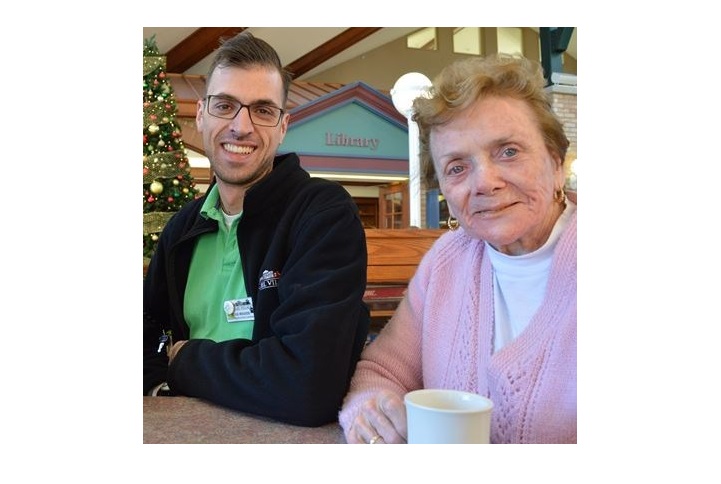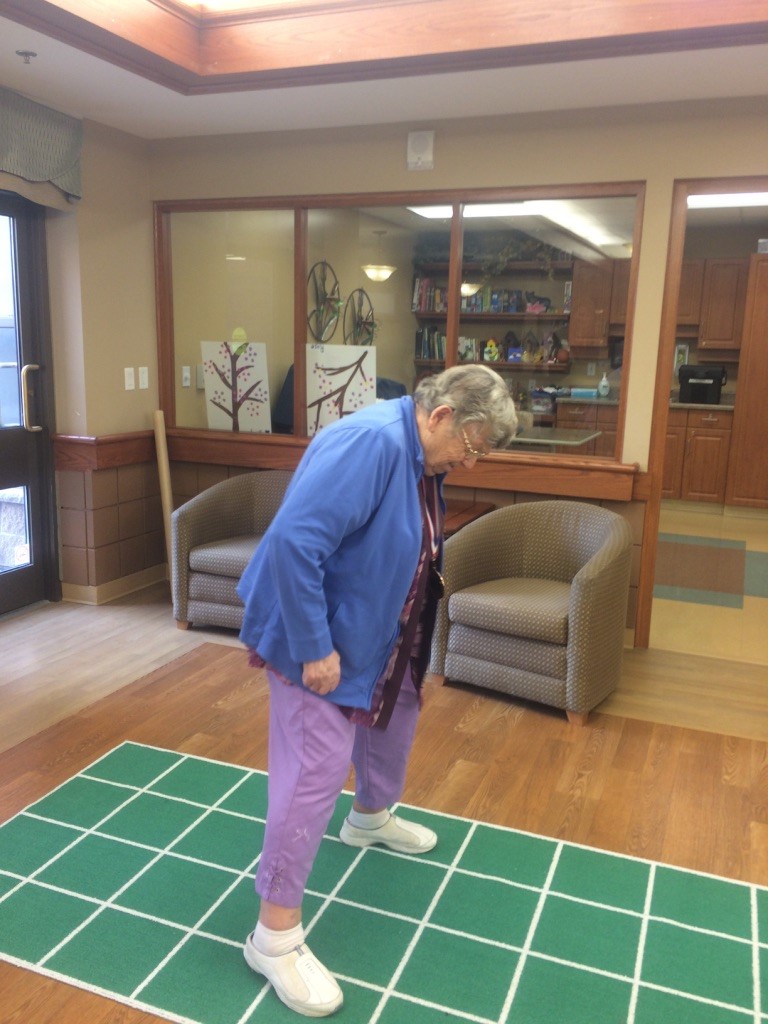Dementia sufferers form a unique family at Emma’s Neighbourhood in Guelph
Dec 21, 2017 by Paul Boreham, For the Mercury Tribune - Reposted with permission | original post

Doug Wigood, coordinator at Emma’s Neighbourhood, sits with Margaret, one of the residents on Main Street
of The Village of Riverside Glen, a retirement facility across from Riverside Park on Woodlawn Road that has
various levels of care. Emma’s Neighbourhood, named after the facility’s founding mother, Emma Schlegel,
who had dementia, is home to 48 residents who suffer from the disease. - Paul Boreham, for the Mercury Tribune
Names of some vulnerable individuals in this story have been omitted intentionally to protect their identities.
A resident of Emma’s Neighbourhood, a memory care wing on the second floor of the Village of Riverside Glen, threads her arm loosely through mine and gives me a smile as we walk along.
Doug Wigood, the Neighbourhood’s co-ordinator, is showing me around his beat, where he and his team see to 48 residents who have dementia of some form.
The common room is painted in soft, brown and white colours, touched by rays of light streaming in through a large south-facing picture window. There’s a piano, a portable basketball hoop and lots of comfy chairs. Some residents are lounging and singing a Christmas song near the fireplace.
“Memory and music — it’s one of the last things you lose, in terms of your memory,” Wigood tells me after my tour.
There’ll be a Christmas singsong every day up until Christmas.
Emma’s is one of several “neighbourhoods” at the large facility on Woodlawn Road, ranging in the level of care.
The Village’s cobbled “Main Street” is a place for the community and visitors to gather for food, entertainment and coffee on the first floor.
Bryce McBain, general manager of Riverside, sits in a small office in the thick of it.
“They see, hear, feel, just like any other resident,” he says of those living with dementia. “Some things have changed, but overall, they’re unique individuals.”
“What I love about our Emma’s neighbourhood is ... many of them ... appear to have no fear. They’re not afraid to be vulnerable, and therefore they take more in from the simple pleasures of life,” McBain says. Unlike many of us, who might need a few drinks to feel comfortable in social situations, typically, people with dementia live in the moment and participate without inhibitions. That explains the lady who took my arm at Emma’s.
“The woman who was walking around with you, she’s never seen you before — never met you — and [yet] she held onto your arm because it was that close connection, that other human that was around,” Wigood adds, searching for the proper words.
Even though she didn’t say a word, I felt instantly connected to her. And I didn’t want her to let go when the tour was finished.
Wigood and his team get very attached to the residents, becoming “like family members.” So much so that some staff are fighting for dibs on who’s working Christmas Day.
There are presents to hand out, music and Christmas dinner to serve at the end of the day. In past years, simple gifts from Riverside have been coffee cups filled with candies, bottles of maple syrup and this year ... that’s a secret.
In the weeks leading up to Christmas, many residents’ families helped decorate their rooms with wreaths and holly, and a surprising amount of Christmas cards arrive daily.
Down on Main Street trees were hung with decorations with the help of residents, followed by a tree lighting ceremony and a Christmas market with local vendors lining Main Street, attended by Mr. and Mrs. Clause and several hundred visitors, McBain says. The whole group at Emma’s will be taken by vehicle across the road to see Sparkles in the Park.
Emma’s 48 residents found each other because a disease of the brain is slowly corroding their memory and they need help with daily living. Dementia is a catch-all name for a number of similar, but slightly varying, memory-related disorders, Alzheimer’s and Parkinson’s being two well-known diseases under the umbrella.
Forgetting recent events, unable to perform basic functions, and at more advanced stages even recognizing loved ones can be a chore for those suffering with it. Over half a million people in Canada are living with dementia today, costing Canadians $10.4 billion annually, according to the Alzheimer’s Society of Canada (and the numbers steadily rise).
Wigood and his team are on the front lines.
“They have created their own family here,” he says. And despite the seriousness of some of the disorders, some amazing things happen all the time at Emma’s Neighbourhood. Here Wigood relates a recent story that “actually made my Grinch heart grow a little bit.”
One of the ladies had been a longtime organist at a local church, and now, afflicted with dementia, she would only play a couple of songs over and over again.
Wigood, a pianist, would listen and say to himself, “she’s playing the same thing, she’s playing the same thing.” That was the ongoing refrain until one morning. With snowflakes drifting down outside the picture window, about 20 residents gathered around the piano on their own accord and, without any facilitation from staff, the former organist began playing Jingle Bells (a different song) and her house mates began singing along.
“I looked at a team member, and I said, ‘OK, go over there and make sure you’re singing the correct words so that you’re helping the rest of them.’” When it was over they all clapped and cheered. Then a staff member started singing Silent Night and the organist, who hadn’t played it in ages, started playing by memory. “Everybody joined in again,” he says. It was a magical moment.
Many of the residents had lived solitary, sometimes reclusive lives. Now, at Emma’s, they have a houseful of mates to share life with.
Wigood goes back to the second floor and finds two members of the group and they come down to the coffee shop for a talk.
Immigrants from Scotland and Italy, they tell me they lost their spouses, and here “there is always somebody new to meet,” whether it’s new members at Emma’s or on Main Street.
“It’s like being at home,” they say, except they “have all these friends.” And “there’s something to do 365 days of the year.”
The greatest gift they’ll receive is spending Christmas with their families in Guelph, especially their grandchildren.
For caregivers of people with dementia not fortunate enough to have loved ones in facilities such as Riverside Glen, Wigood’s advice during the season is to “just slow down.
“When we start a journey of a cognitive impairment, we start to process things just a little bit slower, and even with the quickness of the holiday season and the hustle and bustle, when we walk past somebody without stopping to say ‘How are you? Can I get you something?’ we can start to irritate them.”
McBain adds that including loved ones in baking and other chores make them feel useful and ties in with his message about people coping with memory loss.
“They’re like us: They still long for growth opportunities; they long for meaning in their life; community is important to them; joy is important to them. All these factors play into living in our village.”
Taking a last look up on the second floor at Emma’s, residents have gathered in the dining area for lunch in small groups, talking among themselves.
There are smiles and laughter as some staff hover in the background. Walking out into the slushy street, I still have the sensation of a smiling lady’s arm linked through mine in the most natural and meaningful way.
Residents of Emma’s Neighbourhood give gifts of the here and now. That was my Christmas present.
Read the story of Emma's Neighbourhood
- Previous
- View All News
- Next










